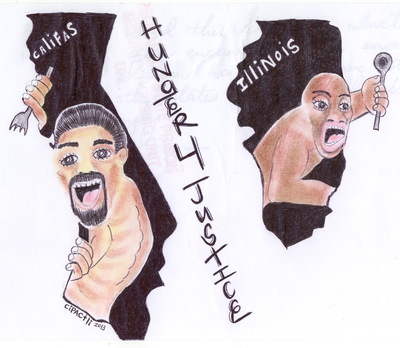
California Control Units: Racial Profiling and Social Control
Just as the oppressed communities are racially profiled as the garbage pits of society that breeds and houses criminals, we prisoners are racially profiled in practically a similar, if not a more blatant extreme. The powers that govern and operate the U.S. Prison Colonies, have catapulted measures that are atypically designed to target prisoners, and criminalize their behavior in relation to belonging to a disruptive prison gang, in particular, those prisoners who are descendants of Afrikan/Mexican origin. They target those prisoners who have demonstrated the capacity of independent thought process (non-conformity), or those who are believed to be some kind of shot caller, with influence over a particular group of prisoners. The independent thought process itself that will enable prisoners to become conscious of the injustices that are perpetrated on a regular basis behind these walls, and so they are considered a threat.
This criminalization is called “The Validation Process.” Prisoners in the SHU (Security Housing Units) at Pelican Bay State Prison, in Kalifornia, have been validated as criminals belonging to a prison gang, for some of the most idiotic reasons. From saying good morning to a fellow prisoner, to signing a fellow prisoner’s get well card for a sick relative, or a loved one. But the most ridiculous reason of them all is the administration paying three collaborating informants to say that you belong to a prison gang! Usually you’ve never even met this paid rat, or only may have by chance possibly shared the same breakfast table with him one morning, or looked at him in a manner that he did not appreciate one afternoon. But yet, the burden of reliability is given to the paid rat automatically, prior to the actual examination of facts. The courts/society are practically lulled to sleep in the midst of this madness, as the U.S. Prison Colony officials have planted the seed in them, that their means of action is just, and required, in the interest of protecting the safety/security of the institution. That’s nonsense! As per Pelican Bay State Prison’s own policies, a gang member is one who is consciously, and knowingly promoting criminal activities for a particular gang. Over 75% of the prisoners housed in the SHU at PBSP are being housed on an indefinite basis as allegedly belonging to a prison gang, but have not committed one rule infraction.
MIM(Prisons) adds: This writer exposes the use of control units for social control in Amerikan prisons. This system of isolation for control has a long history in the Amerikan criminal injustice system. Demonstrated to cause both severe mental and physical damage to humyns, this long-term solitary confinement is nothing less than torture. The recent prisoner hunger strike in California was initiated by prisoners demanding change to the rules behind SHU lockup and improvements to the conditions in the SHU. Conditions are so bad that prisoners are literally wiling to die to fight for change. The importance of control units, as this writer describes, is control of leaders and politically conscious prisoners. This is not about criminal activity, it is about stopping prisoners from spreading consciousness. Many of those targeted for the SHU are actually promoting peace among prisoners, organizing different sets to get together to fight the injustice system. The prisoncrats know this is the real threat to the system.





 Alabama
Alabama
 Alaska
Alaska
 Arizona
Arizona
 Arkansas
Arkansas
 Army Post
Army Post
 California
California
 Colorado
Colorado
 Connecticut
Connecticut
 Delaware
Delaware
 District of Columbia
District of Columbia
 Federal
Federal
 Florida
Florida
 Georgia
Georgia
 Guam
Guam
 Hawaii
Hawaii
 Idaho
Idaho
 Illinois
Illinois
 Indiana
Indiana
 Iowa
Iowa
 Kansas
Kansas
 Kentucky
Kentucky
 Louisiana
Louisiana
 Maine
Maine
 Maryland
Maryland
 Massachusetts
Massachusetts
 Michigan
Michigan
 Minnesota
Minnesota
 Mississippi
Mississippi
 Missouri
Missouri
 Montana
Montana
 Nebraska
Nebraska
 Nevada
Nevada
 New Hampshire
New Hampshire
 New Jersey
New Jersey
 New Mexico
New Mexico
 New York
New York
 North Carolina
North Carolina
 North Dakota
North Dakota
 Ohio
Ohio
 Oklahoma
Oklahoma
 Oregon
Oregon
 Pennsylvania
Pennsylvania
 Puerto Rico
Puerto Rico
 Rhode Island
Rhode Island
 South Carolina
South Carolina
 South Dakota
South Dakota
 Tennessee
Tennessee
 Texas
Texas
 Utah
Utah
 Vermont
Vermont
 Virginia
Virginia
 Washington
Washington
 West Virginia
West Virginia
 Wisconsin
Wisconsin
 Wyoming
Wyoming

